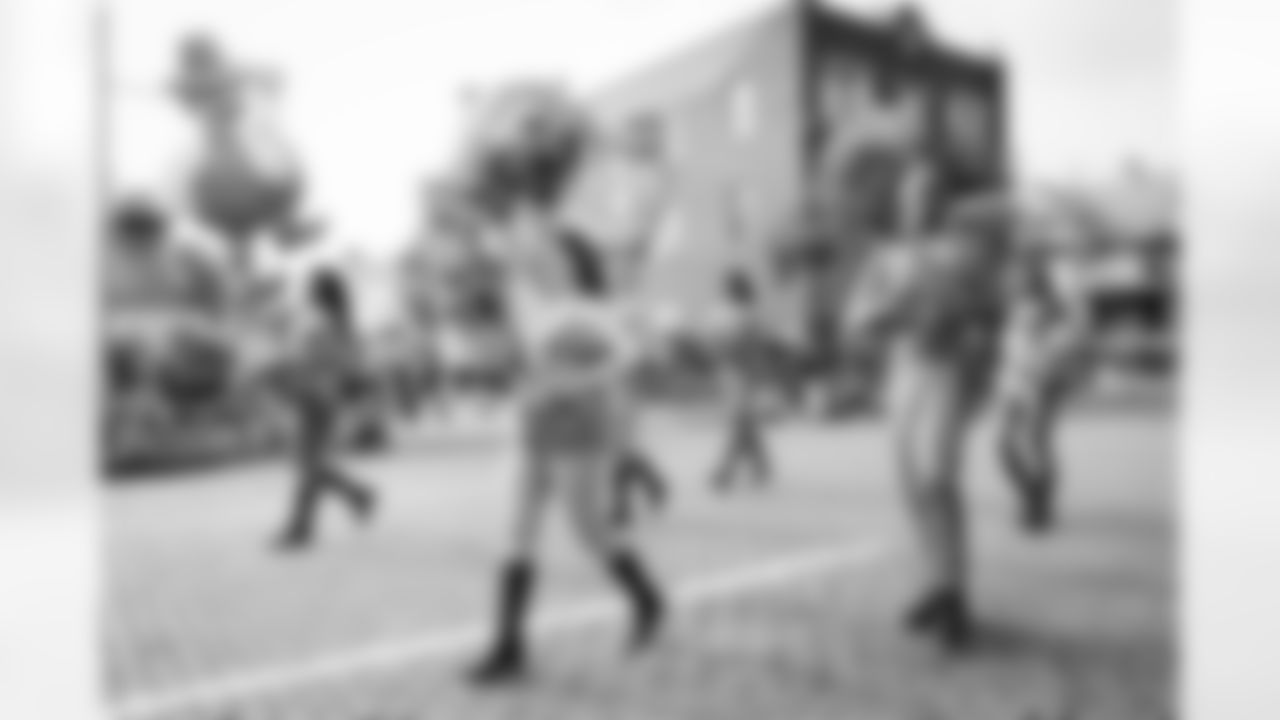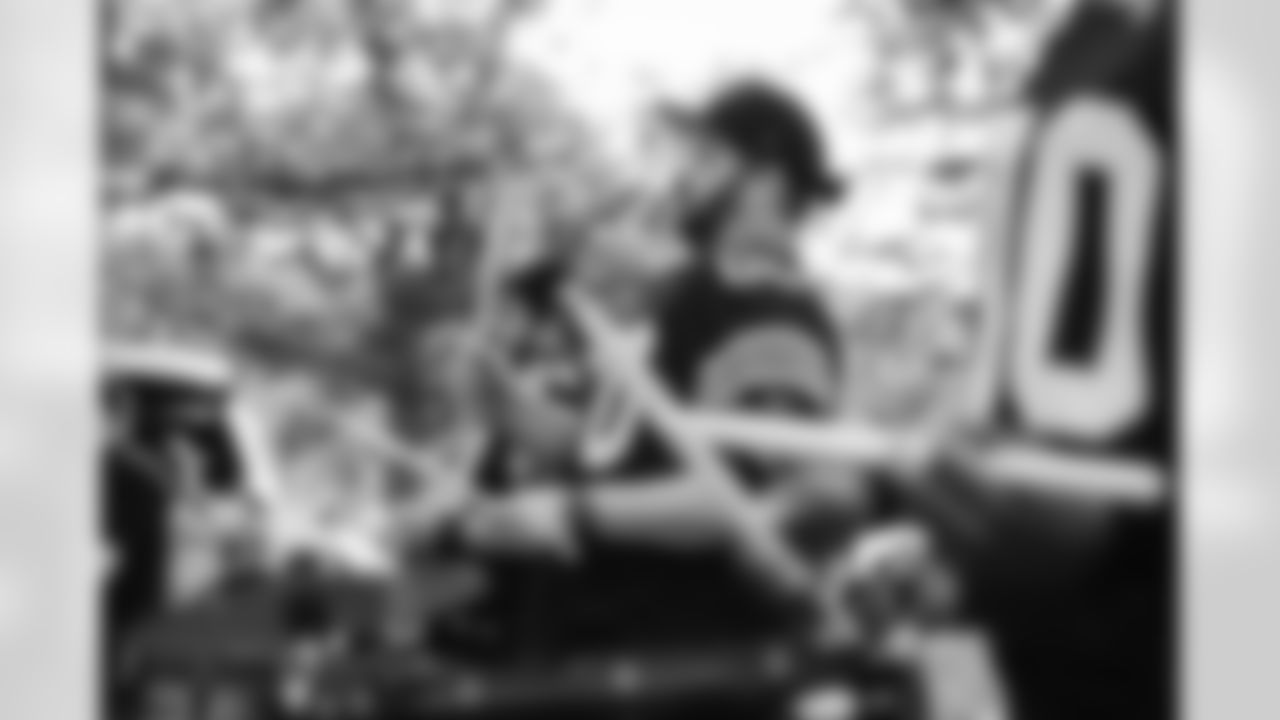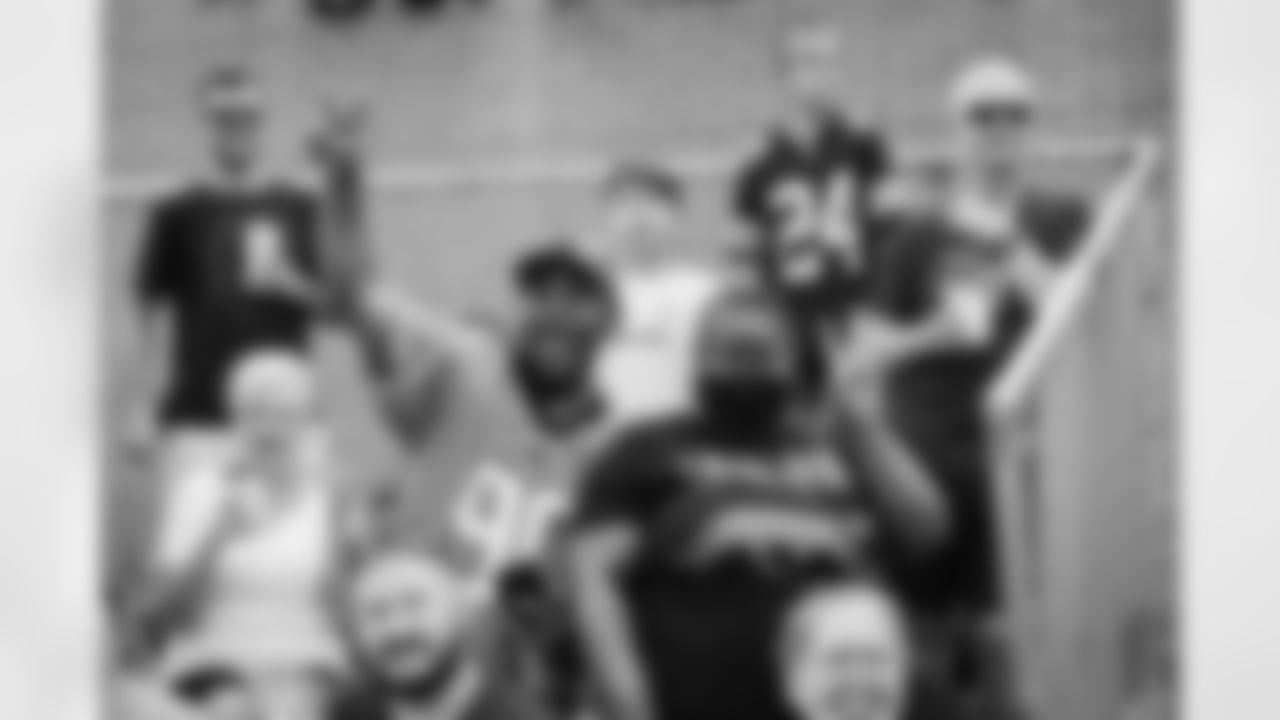CANTON, Ohio — Sam Mills has finally made it home.
The legendary Carolina Panthers linebacker and assistant coach, who led his teams to new heights and then inspired generations in his adopted hometown of Charlotte to even greater ones, was inducted into the Pro Football Hall of Fame Saturday.
And for those who knew, loved, watched, and were amazed by him over the years, it was just in time. This was Mills' final year of eligibility for the Hall as a modern candidate, so the timing added a layer of drama to a story that had plenty at every step along the way.
And this story has never lacked for emotion.
That was true Saturday afternoon, when his widow Melanie Mills said a few words, highlighting her late husband's character. Sam Mills was never considered big enough, but he also never thought he was bigger than anyone.
"If you were working hard at anything, Sam would let you know he appreciated your hard work," she said from the stage, after unveiling the bust that will live among legends now. "You could be a teammate, a coach, a ball boy, a security guard. He would make you feel seen.
"It's no wonder Sam inspired so many people, or that the Panthers adopted his motto, Keep Pounding. Sam was always ready to show you what hard work looked like. He led by example, and people followed him."
And many of those followed him to Canton.
At Friday night's Gold Jacket Dinner, the Mills family, awash in the love of the crowd and the sense of family they found in this year's Hall of Fame class, stood and soaked it all in.
There were dozens of former teammates and co-workers in the crowd at the Canton Memorial Civic Center, but as she stood on the stage, listening to the applause of the crowd celebrating the memory of her late husband, Melanie Mills couldn't pick out any particular faces, except that one.
"I couldn't see anyone, to be honest with you," Melanie said softly, and with a smile. "I could just see Sam. I could just see him, and that's beautiful."
There were always smiles when people talk about Sam Mills, and even through the tears — they all have stories, because of the football player and coach and person he was.
But if there's a common through-line in all of them, it's not the fact he was always too small and overcame things, it's that he always made others feel larger than life so they could too.
Sam's brother Leon Mills still remembers the way he always did it, whether he was hustling up a playground game of football on the rock-hard field near the Seaview Manor housing projects in Long Branch, N.J., or teaching his baby brother how to work out, cook, or drive.
But he also remembers a kid at their school named Horace.
As it turns out, Horace was an unusual kid, not exactly like the rest of the people they grew up with. In hindsight, the things classmates said about Horace make it sound like we'd probably describe him differently now. The nickname they had for him those days, well, it was a different time; it's not the kind of thing you'd call someone now.
That didn't matter at all to Sam Mills, who took Horace in like he was another brother, the 13th child in the family.
"He was a little more than awkward, but we always embraced the best of him," Melanie said of Horace.
That took some doing, because being Horace's friend wasn't always easy.
"Nobody wanted to be around him," Leon said of the kid who wasn't like the rest of them. "But he and Sam became really close, and as a result people started to get close to him, even though he was a pain in the ass, they developed a relationship with this guy, and it was all because Sam took to this guy, and understood this guy was different, and people were shying away from him because of it.
"Sam said, 'Hey man, come on.' They would hang out all the time. . . . Growing up, everybody loved being around Sam. There were some people that a lot of people didn't want to be around. They were different, or annoying, and just weren't cool. But they became accepted by other people because Sam took them in."
That's not the kind of thing you just do, because being a teenager isn't easy anyway, and volunteering to take on a difficult task isn't for everyone.
But as Melanie thinks about that story, she also thought back to Sam's childhood, and thinks she has a clue as to why her husband behaved that way.
As indestructible as he appeared on a football field — he missed just 11 games in 12 NFL seasons, a practicably impossible feat, especially at his size — Sam Mills grew up a little vulnerable.
It's not that he lived in what his brother described as "poverty," or that it took him until he was in high school to have the luxury of his own room. When he was a child, Sam Mills suffered from what his wife referred to as "severe asthma," which his parents struggled with as well.
"He had to wear this special apparatus to school, where you could be teased a lot," Melanie said. "And he probably was teased a lot. You know how young kids are.
"I think in his mind, that made him embrace others that were different or had something different about them."
As it turns out, there was always something different about Sam Mills.
Eddie Balina realized it, when he was playing sports with Sam growing up, from Pop Warner football on up. They'd play together no matter the season, but ended up at different colleges. When Balina went to visit Mills the night before a game between Montclair State and William Patterson, he arrived to find his room empty, because Mills had driven to Wayne, N.J. to go see him.
"I got back to my dorm and my roommate said, 'Guess who was just here?'" Balina said. "We passed each other on Highway 46."

They stayed in touch, checking in on each other during times of triumph and trouble. And if either of them needed a favor, they knew who they could call.
In 1995, Balina was hoping to get his son Andrew a jersey of his favorite player. But in New Jersey, they didn't exactly have a lot of stock of Carolina Panthers jerseys on the shelves.
"I made mention of it, and Sam said not to worry about it, he'd take care of it," Balina recalled. "So Sam starts driving around to every sporting goods store in Charlotte, and walking in and saying: 'Hey, do you guys have my jersey?' He said he had to go to six or seven different places, and he called me and laughed and said, 'Ed, I felt like Rodney Dangerfield, I'm getting no respect.'"
He finally found the jersey, and shipped it to his friend in time to make Christmas a little more special for a child.
"I think my son wore that jersey every day," Balina said. "I mean, who does that? But that's who Sam Mills was."
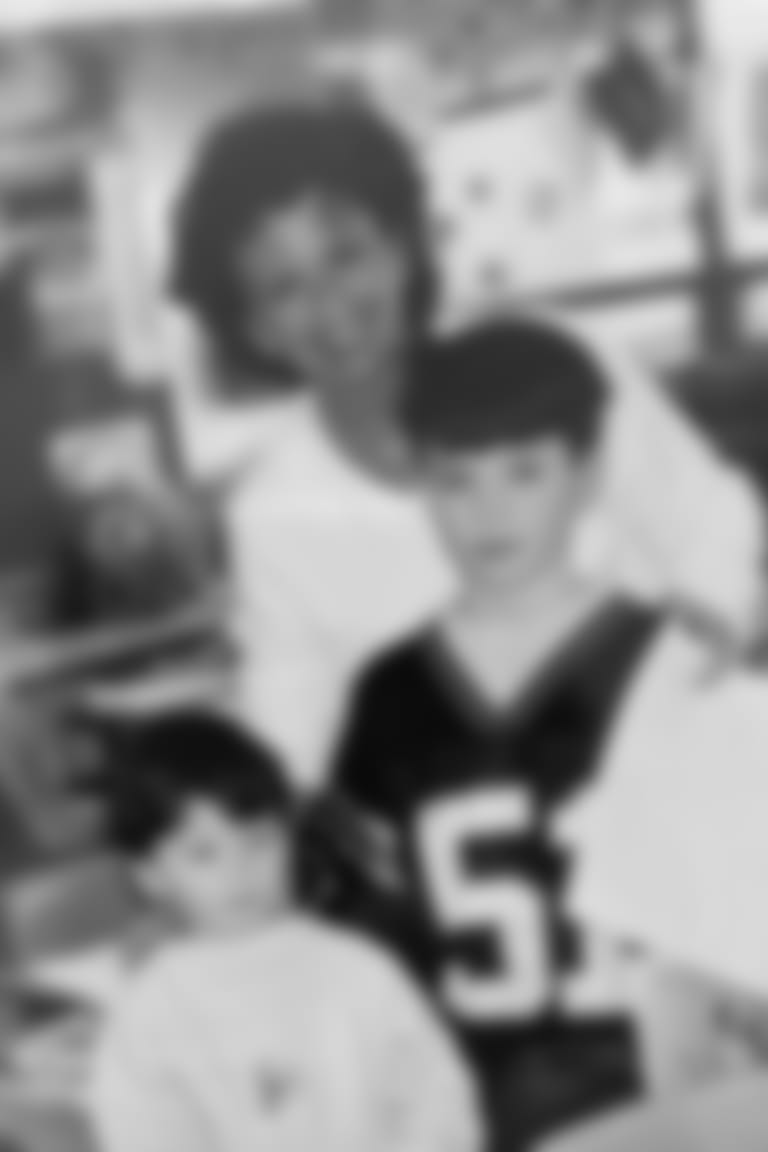
Bill Powers has the same kind of memories. He played at Montclair State with Mills; he was a guard who had to block his fellow co-captain in practice. It wasn't always fun for him.
"Here I am, this six-foot, 245-pound guard," Powers recalled. "We're running a play in practice, I'm pulling and he's blitzing, and it was like I run over by a train. And then he reaches down and helps me up."
That's why this weekend, Powers and 25 former Montclair State players climbed on a bus in New Jersey, and rode over 400 miles so they could be a part of it all. Yes, 40 years later, a bunch of Division III players made the trek to celebrate the best of their own.

Powers still has the original Keep Pounding wristbands that honored Mills' fight with cancer, which was diagnosed in 2003.
Mills was originally given three months to live. As you might imagine, he went far beyond every expectation, coaching through the 2003 season, and giving the speech of a lifetime the day before the Cowboys playoff game. It worked, as the Panthers thrashed Dallas the next night, the first step on their march to the Super Bowl.
Mills was in pain. Let's be honest, Mills was dying. But he never stopped.
But no one who knew Sam Mills would have imagined anything differently.
"I never heard him say I can't," his former teammate and co-worker Brett Maxie, of Mills' closest friends, said. "I heard him say I will."
That will to live was never felt more strongly during that Super Bowl run.

His longtime agent, Brett Senior, remembers talking to Mills in the days leading up to the trip to Houston, after the Panthers had stunned the Rams and the Eagles in succession, and stood a game away from glory.
"He called me, and he said, 'I don't know if I can do this, I'm hurting,'" Senior recalled.
Like Mills, Senior was a wrestler in high school, used to facing challenges head-on.
"I remember him saying, 'It's time to go out on the mat,'" Senior said. "And sure enough, the morning of the Super Bowl, he went out and ran two miles.
"He had an incredible desire to be with his family on the field that day, and nothing was going to stop him. I still cry about it now, just thinking about it."
He wasn't the only one.
Mills stood at a podium that week, and carried his message of perseverance to a worldwide audience. He looked a little paler than normal, and he was dripping sweat, and had a towel with him to keep it from looking as obvious.

"You have your good days and your bad days," he said. "I'm just glad I am having days, you know?"
But through it all, he never asked for a break.
When they learned of his cancer diagnosis that year during training camp, the Panthers started putting contingency plans in place. They had another coach on staff that year, Ken Flajole, who had a background in coaching linebackers. Flajole was ready, and willing, to take on whatever he needed to do.
But there was a reason they didn't offer Mills a day off.
Then-defensive coordinator Mike Trgovac is a bear of a man, and when he lifts weights in his basement, there's still what he refers to as "a shrine" to Mills there, a photo on the wall, some personal mementos. So he thinks about Mills on a regular basis.
Going back over their days together, Trgovac marveled at Mills' aptitude for football, on the field on off. Not only did he have a stellar playing career, but he was also a strategist. He got football in the way that few people did.
During the 2003 offseason, the Panthers talked about mixing up a defense which was already doing some incredible things. In 2001, when they went 1-15, the Panthers ranked 31st in the league in total defense. In 2002, they were second in the league in that same ranking, while playing with an offense that didn't offer much help.

So they put their heads together.
For years in the USFL and in the NFL, Mills starred in the middle of the a 3-4 defense. The Panthers were firmly a 4-3 team, based on personnel and the philosophy of head coach John Fox. But Fox wasn't afraid to mix things up, so Trgovac and Mills started brainstorming early in the spring to try to make a good thing better. What if they threw a wrinkle at opponents by showing some 3-4 looks in from time to time, lining Julius Peppers and Mark Fields up at outside linebacker, with Mills protege Dan Morgan in his mentor's old spot and a stout front three of Mike Rucker, Kris Jenkins, and Brentson Buckner? It could work.
Peppers is going to end up in the Hall alongside Mills soon since he's fourth on the all-time sack list with 159.5, and Fields had 7.5 sacks in 2002, despite playing in a defense that didn't create pure pass-rush opportunities for him.
"Can you imagine what that would have been like, just as something different to show people?" Trgovac said with a little bit of an evil laugh.
The plan never got off the ground once Fields was diagnosed with Hodgkin's lymphoma during that camp and was lost for the season, but that defense was still good enough to power a Super Bowl run.

But thinking about the work, and the spark of creativity reminds Trgovac of what a special football mind and what a special friend, Mills always was.
During a recent phone conversation, Trgovac pulled his car off the side of the road so he could talk. Dogs in the car or public safety might have been one reason, but the way he gets choked up when he tells the stories about Sam Mills makes you realize it wouldn't have been easy to drive with tears in his eyes.
"The first thing he told me when he found out he was sick, he said, 'Trgo, promise me you won't treat me any differently. I can do this.
"'Promise me you won't take anything off my plate, let me do this — it's all I've got left.'"
Stories like that show why there are so many people in Canton this weekend.
Former assistant coach Jim Skipper is here, flying in from his Arizona home to be a part of the celebration, despite the fact that commercial air travel is complicated at the moment. "Trust me," Skipper said, "if it wasn't for Sam, I wouldn't be getting on a plane right now."
The 73-year-old Skipper was an assistant coach in the USFL when he met Mills for the first time, and followed him and Jim Mora to New Orleans before moving to Charlotte in 2002. They have a lot of shared history.
So the news of Mills' cancer diagnosis hit hardest on the ones closest to him. Because Skipper had a place in Arizona, he and Mills were often in contact when Mills went there to seek some alternative treatments, since conventional medicine didn't always offer the hope he insisted everyone else have in him.
"It was real hard, but it would have been worse if it was sudden," Skipper said. "You endured it piece by piece. My heart had started reacting the day he checked himself into the hospital."

But as Mills said in Houston, there were good days and bad days, but he was glad to be having days. So on one of the good ones, he let Skipper talk him into going to a golf course. Skipper was encouraged when Mills showed up with a sack of fast food, because that meant he was eating, and would have a little energy.
"We had arranged to play, and then the next day, he said, 'I don't know if I have the strength,'" Skipper recalled. "But I get there the morning of, and he says, 'OK, let's go.'"
Mills was beginning to fade, but they got to the sixth hole (playing nine was going to be ambitious anyway), and Skipper recalled it being a long par-5.
"About 250 yards straight down the middle," Skipper said with a laugh. "For a guy who wasn't sure he had the strength, he walloped it. . . .
"But I kept thinking about Sam's spirit. Even when he told me that day on the golf course, 'I can't go no more,' I egged him on a little, and sure enough, and he kept going."
Late in the game, Mills sometimes needed a push. But mostly, he spent his life doing that for others.
His youngest brother Leon, who said Sam "was more than a brother to me, he was like my father," remembers how tough those last days were. To see someone so strong cut down before his 46th birthday was hard to comprehend, it wasn't supposed to be that way, he had more people to take care of. That was a football team he intended to keep coaching, and that was his family and friends.
So he did.

"The whole time, he was stronger than all of us," Leon Mills said. "He was determined to beat it. And also determined to not stop living my life. He said, 'I want to do what I wanted to do, which was coaching.'
"It was a very difficult time. Near the end, I mean, Sam was Sam until the end. A few of the family members, when he spent his last time in the hospital, we spent some time with him. He was laying in the hospital bed, and said, 'Hey, if anything does happen, if there's a funeral, I want to make sure everybody eats good.'
"I'm like, this guy is crazy, but he said, 'I want everybody to have all the fried chicken they want.'"
There was plenty of fried chicken that spring afternoon in 2005. It was delicious.
So was this weekend for Mills' family and friends, a perfect conclusion to a life spent making others feel warm and welcome. As good as Sam Mills was at football, and he was very good, his real strength was in the way he lifted others up through his story.
And he continues to, long after his passing, and there are no indications it's going to stop anytime soon.
For longtime football executive Terry Bradway, Saturday brings a long and glorious football life full circle.
Bradway was a personnel executive with the USFL's Philadelphia Stars the day Mills tried out at Penn Charter High School, his last chance at his dream of playing professional football. They offered him on the spot. Mills would take two months to eventually accept the offer, since he had just taken a job at a shop teacher at a New Jersey high school to provide for his young family.
Everyone who knew Sam Mills knew he'd eventually take it — the chance to keep playing football was probably something he'd have paid for — and that was the launching pad to a career that eventually landed here at the Hall of Fame.
Nearly 40 years later, Bradway works as a consultant for the Panthers, and said being associated with the first and last franchises Mills played for gives him a feeling he can't quite describe — but one that takes him back to the time when most people didn't think Mills was big enough to make it in football at all, much less to its greatest peak.
"To be there at the start, and now to be here with the Panthers where the whole 'Keep Pounding' thing started, it gives me chills to think about being with a team that's involved in doing that," Bradway said. "It's really special.
"You don't want that story to die. It's powerful. It really is."
And after Saturday, at long last, it never will.
View photos from the ceremony in Canton as Melanie Mills and Jim Mora presented Sam Mills for the Pro Football Hall of Fame.
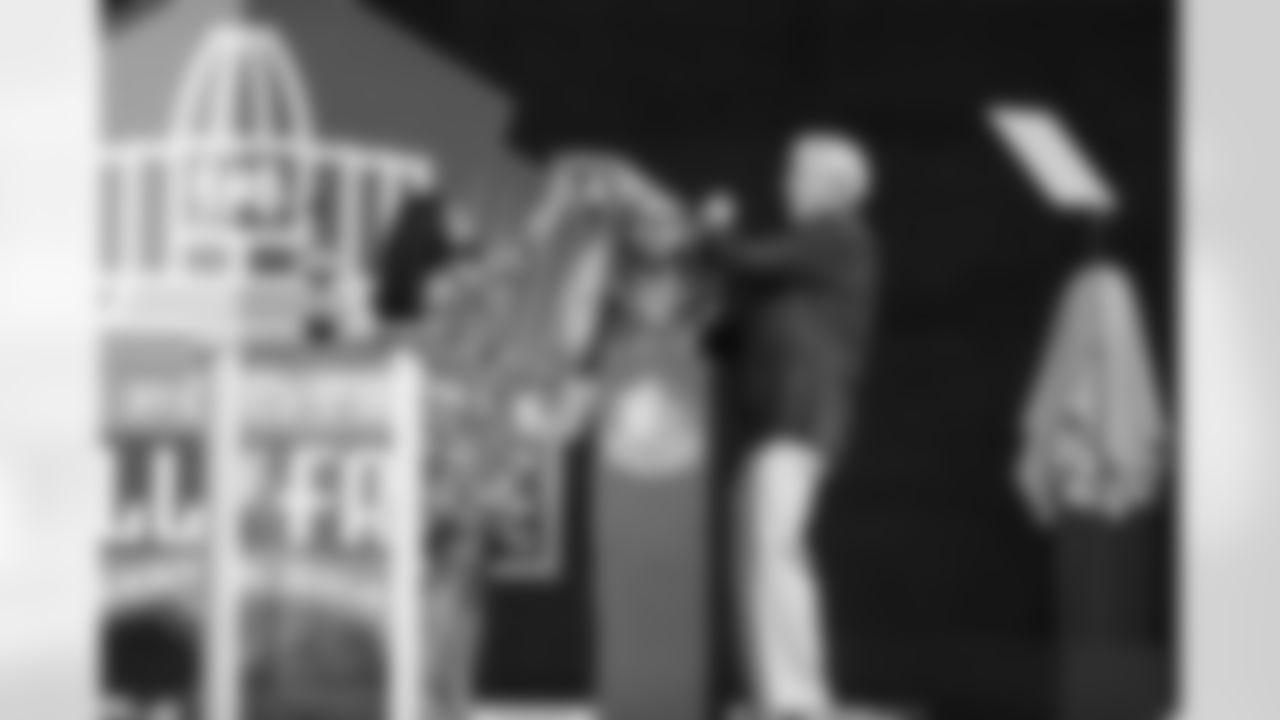
Melanie Mills and Jim Moore Sr. unveil the bust of Sam Mills during the 2022 Hall of Fame Weekend on Saturday, August 6, 2022 in Canton, Ohio. (Olivia McLucas/NFL)

The bust of Hall of Fame class of 2022 member Sam Mills during the 2022 Hall of Fame Weekend on Saturday, August 6, 2022 in Canton, Ohio. (Lauren Bacho/NFL)

Melanie Mills speaks during the 2022 Hall of Fame Weekend on Saturday, August 6, 2022 in Canton, Ohio. (Olivia McLucas/NFL)

Melanie Mills and Jim Moore Sr. with the bust of Hall of Fame class of 2022 member Sam Mills during the 2022 Hall of Fame Weekend on Saturday, August 6, 2022 in Canton, Ohio. (Lauren Bacho/NFL)

Melanie Mills and Jim Moore Sr. unveil the bust of Sam Mills during the 2022 Hall of Fame Weekend on Saturday, August 6, 2022 in Canton, Ohio. (Olivia McLucas/NFL)

Melanie Mills and Jim Moore Sr. unveil the bust of Hall of Fame class of 2022 member Sam Mills during the 2022 Hall of Fame Weekend on Saturday, August 6, 2022 in Canton, Ohio. (Ben Liebenberg/NFL)
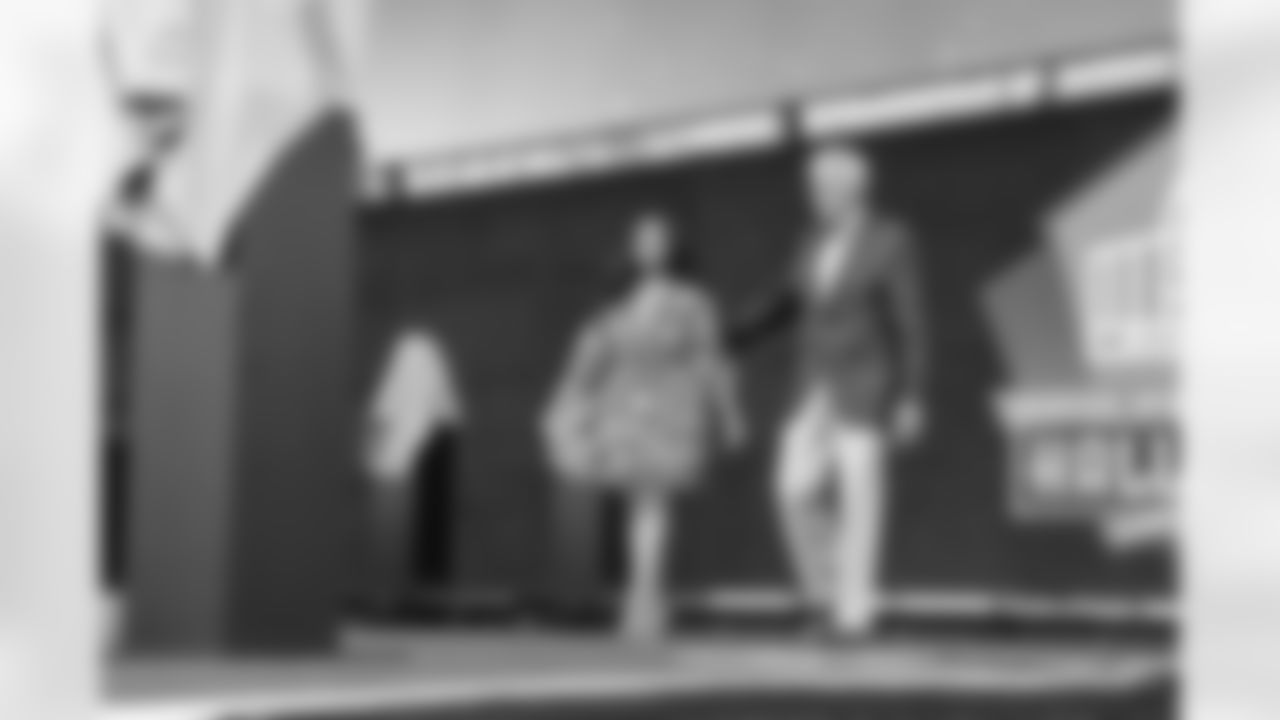
Melanie Mills and Jim Moore Sr. on stage during the 2022 Hall of Fame Weekend on Saturday, August 6, 2022 in Canton, Ohio. (Ben Liebenberg/NFL)

Melanie Mills and Jim Moore Sr. with the bust of Hall of Fame class of 2022 member Sam Mills during the 2022 Hall of Fame Weekend on Saturday, August 6, 2022 in Canton, Ohio. (Lauren Bacho/NFL)

Melanie Mills and Jim Moore Sr. unveil the bust of Hall of Fame class of 2022 member Sam Mills during the 2022 Hall of Fame Weekend on Saturday, August 6, 2022 in Canton, Ohio. (Ben Liebenberg/NFL)

Melanie Mills and Jim Moore Sr. unveil the bust of Hall of Fame class of 2022 member Sam Mills during the 2022 Hall of Fame Weekend on Saturday, August 6, 2022 in Canton, Ohio. (Ben Liebenberg/NFL)

Melanie Mills speaks on stage during the 2022 Hall of Fame Weekend on Saturday, August 6, 2022 in Canton, Ohio. (Ben Liebenberg/NFL)

Melanie Mills with the bust of Hall of Fame class of 2022 member Sam Mills during the 2022 Hall of Fame Weekend on Saturday, August 6, 2022 in Canton, Ohio. (Lauren Bacho/NFL)

Melanie Mills speaks on stage during the 2022 Hall of Fame Weekend on Saturday, August 6, 2022 in Canton, Ohio. (Ben Liebenberg/NFL)

The bust of Hall of Fame class of 2022 member Sam Mills during the 2022 Hall of Fame Weekend on Saturday, August 6, 2022 in Canton, Ohio. (Lauren Bacho/NFL)

Melanie Mills with the bust of Hall of Fame class of 2022 member Sam Mills during the 2022 Hall of Fame Weekend on Saturday, August 6, 2022 in Canton, Ohio. (Lauren Bacho/NFL)

Melanie Mills speaks during the 2022 Hall of Fame Weekend on Saturday, August 6, 2022 in Canton, Ohio. (Olivia McLucas/NFL)
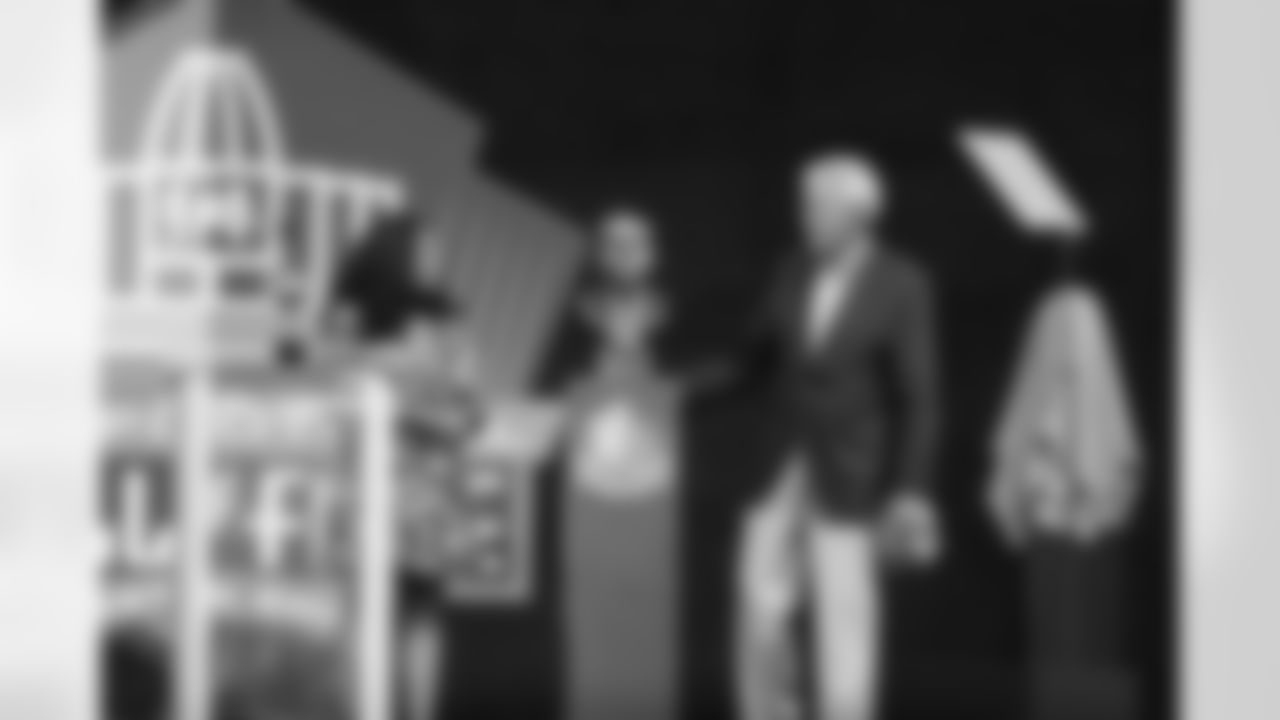
Melanie Mills and Jim Moore Sr. unveil the bust of Sam Mills during the 2022 Hall of Fame Weekend on Saturday, August 6, 2022 in Canton, Ohio. (Olivia McLucas/NFL)
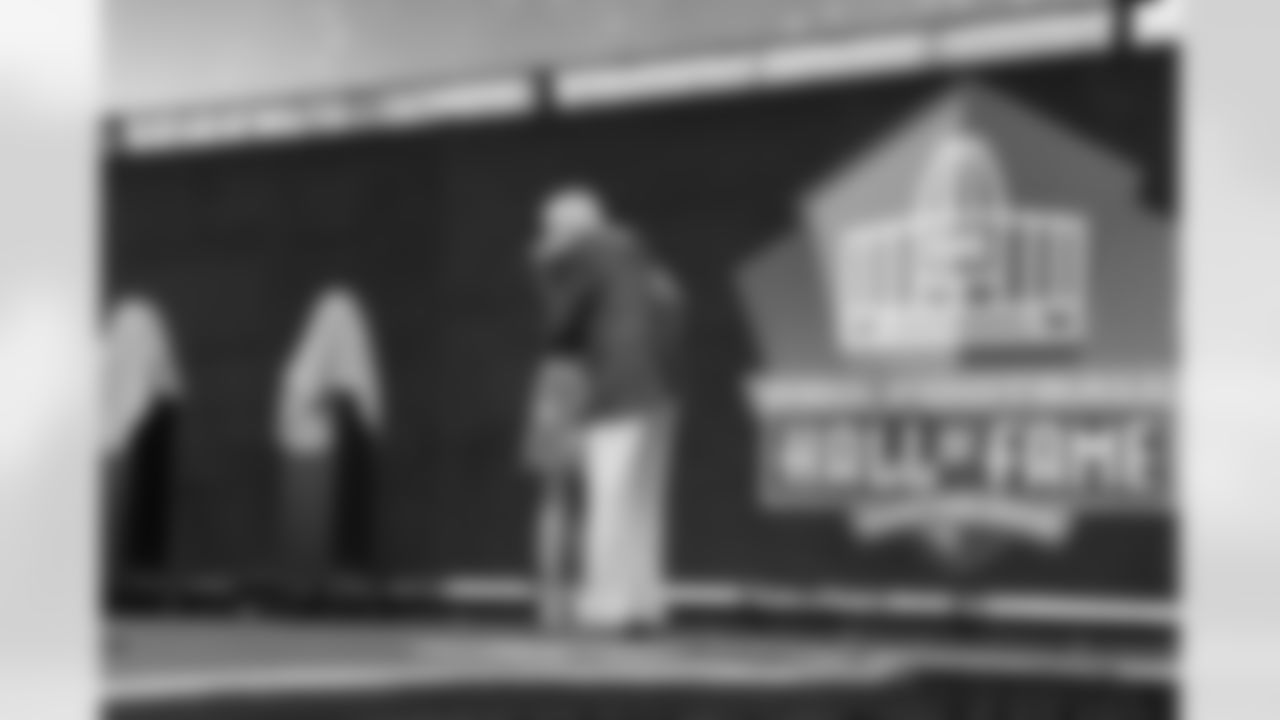
Melanie Mills and Jim Moore Sr. on stage during the 2022 Hall of Fame Weekend on Saturday, August 6, 2022 in Canton, Ohio. (Ben Liebenberg/NFL)

Melanie Mills speaks on stage during the 2022 Hall of Fame Weekend on Saturday, August 6, 2022 in Canton, Ohio. (Ben Liebenberg/NFL)

Melanie Mills and Jim Moore Sr. unveil the bust of Sam Mills during the 2022 Hall of Fame Weekend on Saturday, August 6, 2022 in Canton, Ohio. (Olivia McLucas/NFL)





